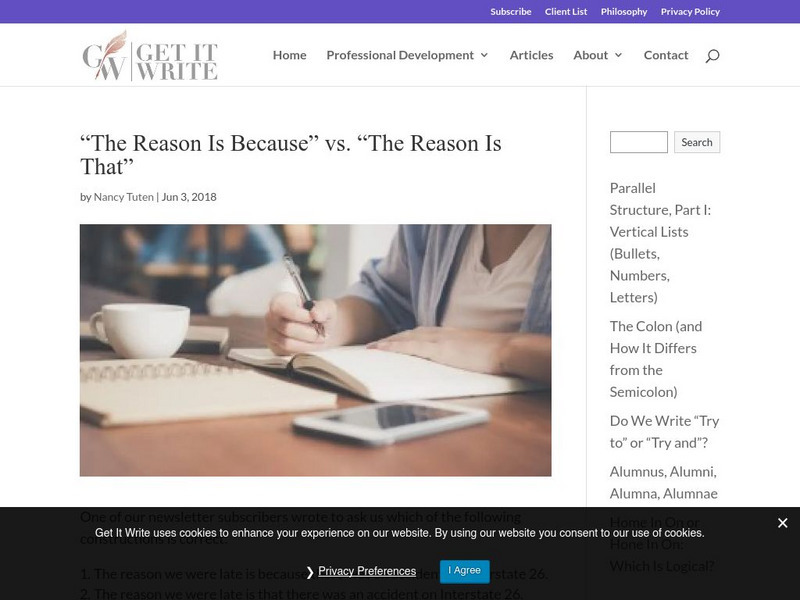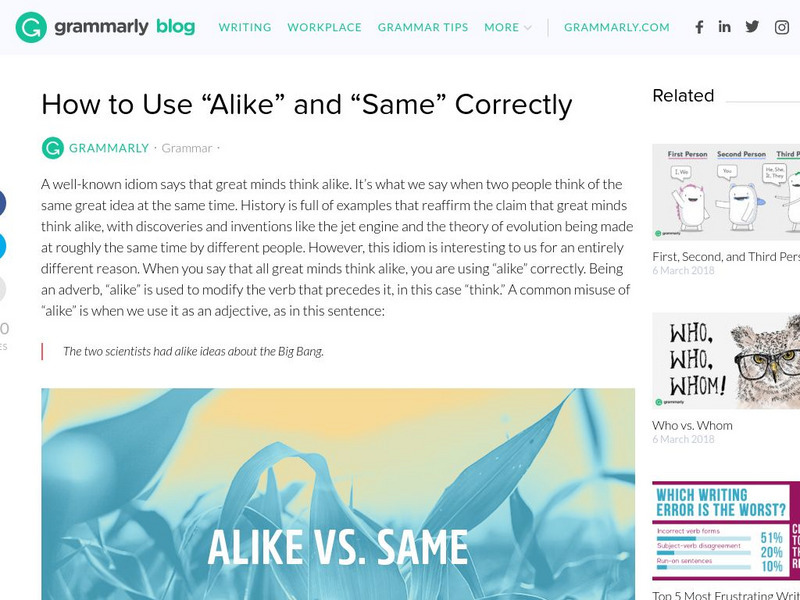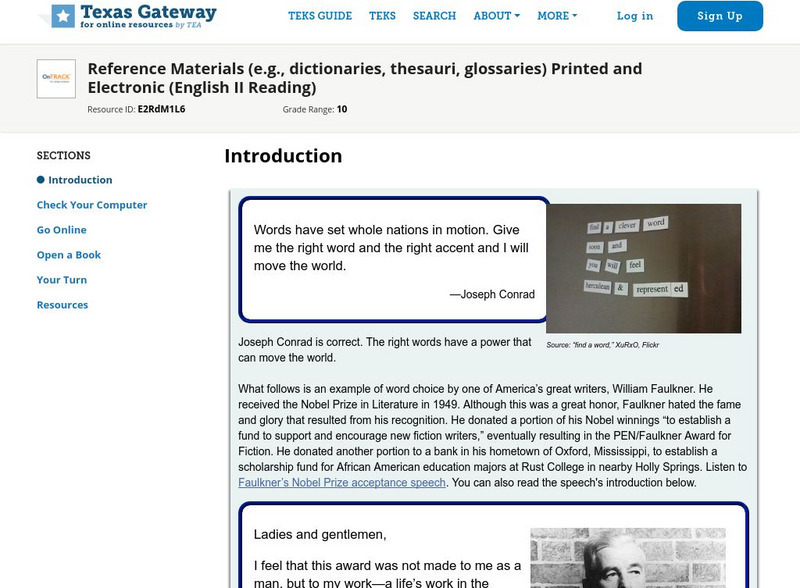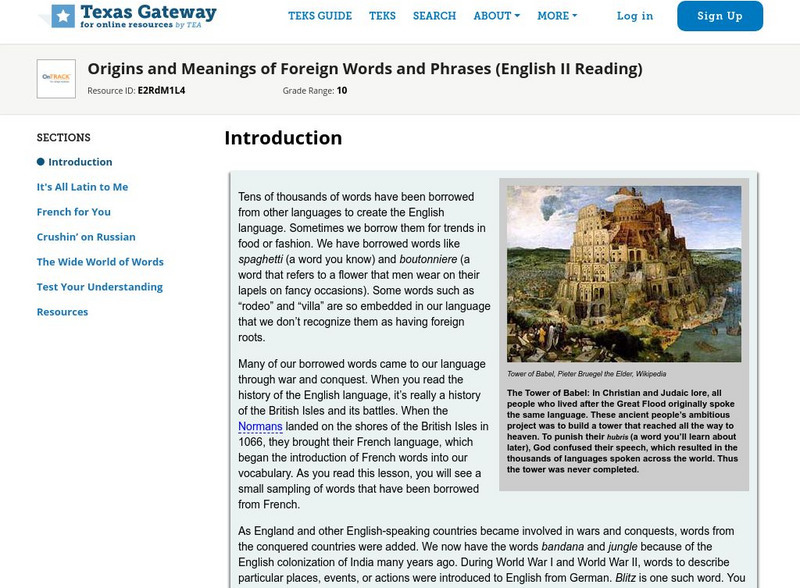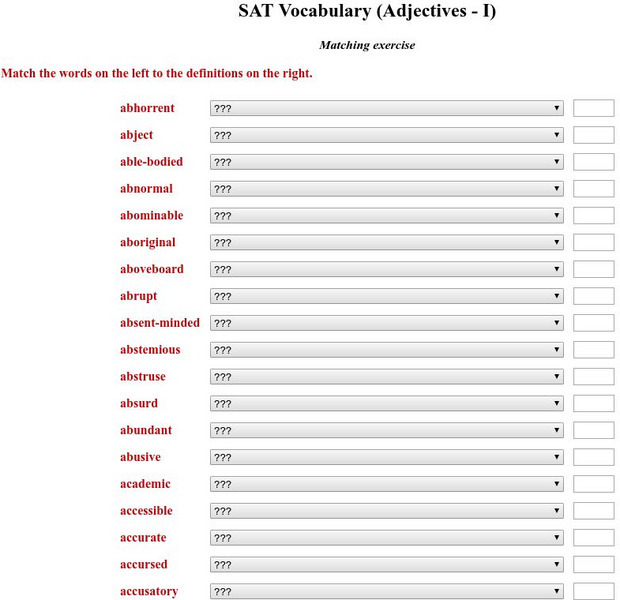Texas Education Agency
Texas Gateway: Linguistic Roots and Affixes (English Ii Reading)
[Accessible by TX Educators. Free Registration/Login Required] You will be able to recognize linguistic roots and affixes to use in determining the meaning of academic English word and in other content areas.
Lumen Learning
Lumen: Critical Reading: Vocabulary
This lesson focuses on increasing your vocabulary including using context clues, dictionaries, and your working vocabulary. It also offers two videos with strategies for enhancing your vocabulary.
Other
Oxford Dictionaries: Do You Know Your Ibles From Your Ables?
Rules and examples for words ending in the suffixes -able and -ible.
Get It Write
Get It Write: Anymore and Everyday
Knowing the difference between the use of words adverbially and adjectivally is essentia, especially when using "anymore" and "any more" and "everyday" and "every day." A very good explanation of the usage is given along with many...
Get It Write
Get It Write:tuten and Swanson: "The Reason Is Because" vs. "The Reason Is That"
This site briefly explains why the phrase, "the reason is because," should never be used when you mean "the reason is that." A self test is provided at the end of the article.
Get It Write
Get It Write: Cyberlanguage
Find out what various style manuals recommend in the way cyberlanguage is written.
Wisc-Online
Wisc Online: English Words of French Origin
In this learning activity, students read and listen to English words from the French language.
Love To Know Media
Your Dictionary: How to Solve Cryptograms
This article provides detailed tips on how to solve cryptograms such as looking for repeated words, solving the short words first, and looking for digraphs and common letters.
Grammarly
Grammarly Blog: How to Use "Alike" and "Same" Correctly
An explanation with examples of using the words "alike" and "same" correctly in sentences.
TED Talks
Ted: Ted Ed: Grammar's Great Divide: The Oxford Comma
If you read "Bob, a DJ and a clown" on a guest list, are three people coming to the party, or only one? That depends on whether you're for or against the Oxford comma- perhaps the most hotly contested punctuation mark of all time. When...
TED Talks
Ted: Ted Ed: Where Do New Words Come From?
Marcel Danesi explains how new words enter a language. L.11-12.1a Gram/Usage changes
Texas Education Agency
Texas Gateway: Reference Materials: Printed and Electronic (English Ii Reading)
This lesson focuses on using resources such as dictionaries, thesauruses (or thesauri), and glossaries to find and use words that will improve not only your reading skills but also your writing skills. L.11-12.4c References
Texas Education Agency
Texas Gateway: Origins & Meanings of Foreign Words & Phrases: English Ii Reading
In this lesson, you will be introduced to selective lists of words. These words can help enrich your language, deepen your understanding of what you read, and broaden your sense of the world.
Bartleby
Bartleby.com: Reference
Site provides links to a wide variety of reference tools, including encyclopedias, dictionary, thesaurus, quotation books, and guides to English usage. L.11-12.1b Usage issues
Other
The Phrase Finder: Home Page
"A professional writers' resource from The Phrase Finder for generating ideas for headlines, advertising copy, song lyrics, etc." Just type your word and the phrase finder will find a phrase to match it. L.9-10.4c References, L.9-10.4d...
Bartleby
Bartleby.com: Strunk's Elements of Style: Words and Expressions Commonly Misused
Common misused words are defined. Examples of how to use them correctly are provided. Some examples are "all right" to "would", "as good or better than", and "as to whether."
Vocabulary.com
Words Plagued by Unusual Silent Letters
This site contains a list of 20 words with commonly misspelled words that have silent letters. Teachers can digitally assign this list to their students to reinforce the spellings, pronunciations, and meanings of these words.
Love To Know Media
Your Dictionary: Teaching Confused and Unfamiliar Words
This article provides tips for teaching confused and unfamiliar words to students. These include being familiar with the words, using pictures to visualize the words, and practicing.
TED Talks
Ted: Ted Ed: How Did English Evolve?
This lesson focuses on the evolution of the English language. What is the difference between "a hearty welcome" and "a cordial reception"? In a brief, action-packed history of the English language video, Kate Gardoqui explains why these...
TED Talks
Ted: Ted Ed: Making Sense of Spelling
What can spelling tell us about relationships between words? While spelling may sometimes seem random or unexpected, this lesson illuminates how peeling back the layers of spelling helps us understand the complex history and meaningful...
College Claparede (Switzerland)
English Exercises Online: Sat Vocabulary
Matching exercise including 30 popular vocabulary words on the SAT.
Rutgers University
Rutgers University: History of the English Language
This site provides a brief description of the history of the English language.
Khan Academy
Khan Academy: Frequently Confused Words: Too to Two
Can you tell the difference between the words 'to,' two,' and 'too'?
Khan Academy
Khan Academy: Frequently Confused Words: There Their They're
Do you know when to use 'there,' 'their,' and 'they're'?






